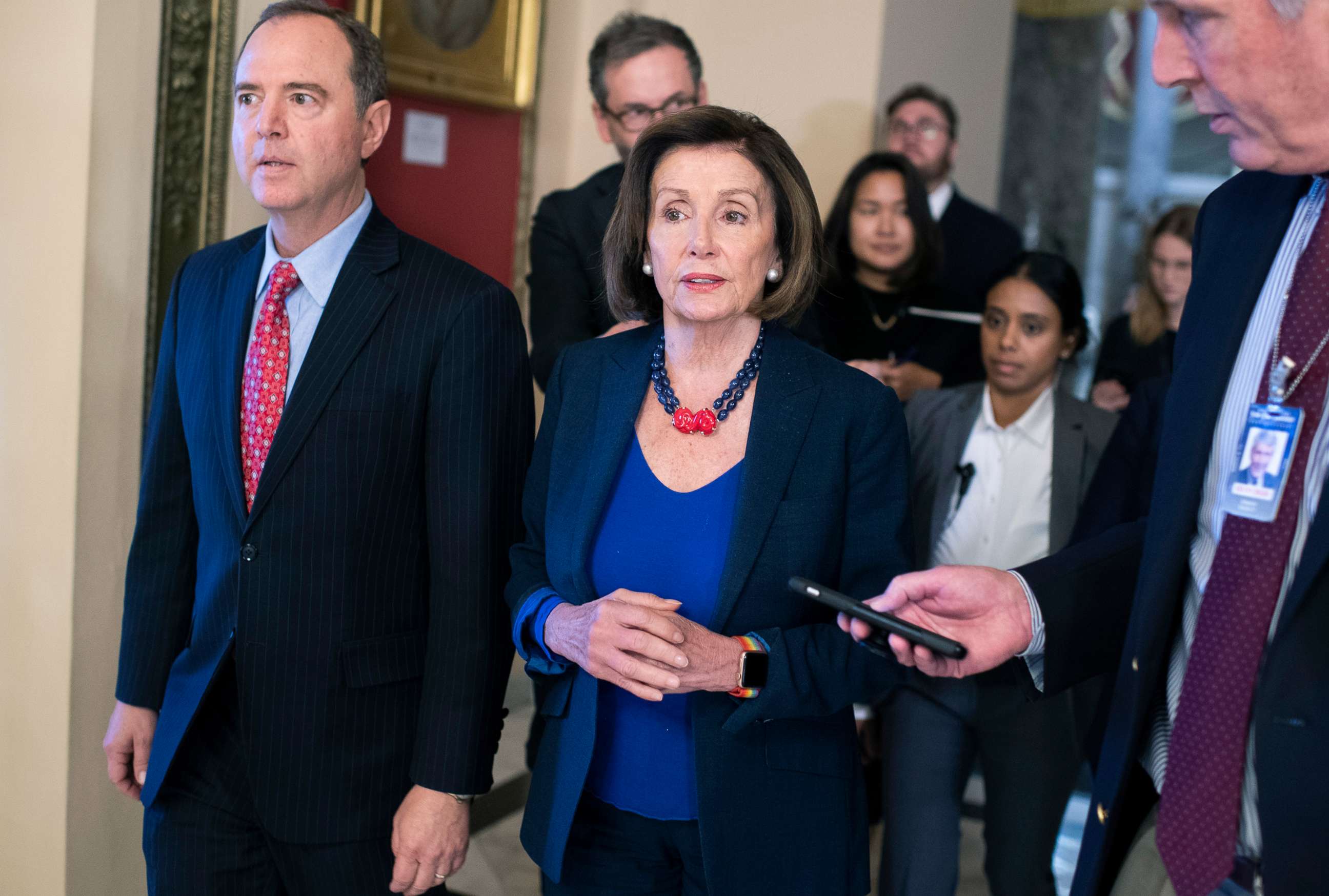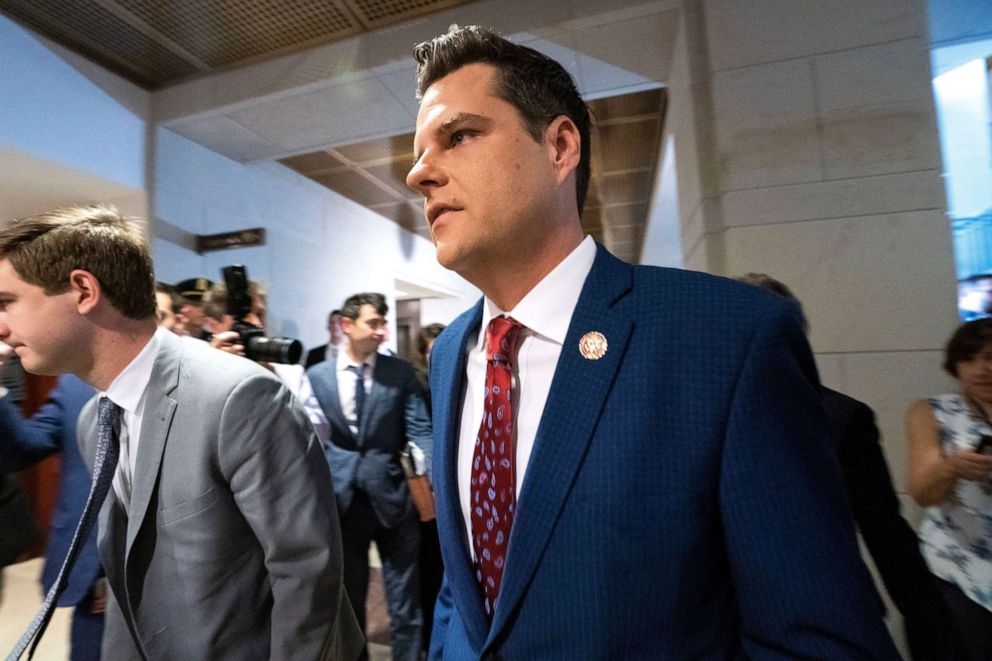What to watch for next in the rapidly unfolding impeachment inquiry
The fast-moving impeachment inquiry is going into its sixth week.
It’s been only five weeks since Democrats launched an impeachment inquiry into President Donald Trump, and developments continue to unfold at a breakneck pace.
Here are three things to watch for next:
House members go on record, and party loyalty is tested
After several days of Republicans and President Trump hammering the impeachment inquiry as unfair and illegitimate, House Speaker Nancy Pelosi abruptly switched course this week and announced a resolution she said would affirm the ongoing investigation and create a process for open hearings. That vote could happen as early as Thursday.

While the resolution isn’t on impeachment itself – only on the process going forward – the vote will put every member on record on the validity of the impeachment probe. That could be a tough position for both Republicans and Democrats in more moderate districts and pave the way for political attack ads on both sides.
Barbara Comstock, a former Republican congresswoman from Virginia, predicted the GOP will ultimately stick together.
“My impression is there will not be a lot of breaks,” Comstock told Devin Dwyer Tuesday on ABC News Live's "The Briefing Room."
"The Republicans will hold on this because they feel the entire process is unfair,” she said.
Still worth watching, though, will be Republicans in swing districts like Rep. Fred Upton of Michigan, whose area supported President Barack Obama before swinging behind Trump in 2016. Nevada Republican Rep. Mark Amodei, who supports Trump, faced pushback in his district after saying he supports congressional oversight efforts.
Several GOP lawmakers also are planning to retire, making them considered more likely to break ranks, including GOP Reps. Will Hurd of Texas and Francis Rooney of Florida. Neither has ruled out voting in favor of impeachment.
Even if only a few Republicans vote in favor of an impeachment inquiry, any crossover by members of the president's party will serve as a black eye to Trump ahead of the 2020 election.
On the flip side, Democrats in districts that supported Trump could easily find themselves vulnerable to political challenges because of their vote.
One of those Democrats -- Rep. Anthony Brindisi of New York -- tells ABC News he doesn’t know how he’ll vote. Another Democrat in Trump country -- Rep. Jeff Van Drew of New Jersey – said he’ll oppose the resolution.
"I just believe it's the right thing to do,” he said. “I think we've spent all this time and all this money, all this energy, all this effort, and all this toxicity exists here, because of what's going on. I want to get bills done."
The cameras start to roll
Following the House vote, Democrats are expected to begin calling witnesses for public testimony. Those televised hearings may give Americans a chance to hear directly from people who have worked inside the White House or State Department with direct knowledge of Trump’s actions.
At the top of the list will be Alexander Vindman, an Army lieutenant colonel assigned to work at the White House, who listened to the phone call before Trump and Ukraine’s president.
In closed-door testimony, Vindman has already told Congress he thought it wasn’t “proper to demand that a foreign government investigate a U.S. citizen” – a reference to Trump pressing Ukraine’s president to launch an investigation that included Democrat Joe Biden and Biden’s son, Hunter. Vindman said he thought a foreign-led investigation into Trump’s political rival would “undermine U.S. national security.”
Another likely witness is former ambassador Marie Yovanovitch and her replacement as top U.S. diplomat in Ukraine, Bill Taylor, who told Congress last week that he was informed “everything” – including $400 million in U.S. military aid to help Ukraine defend itself against Russia – was contingent upon Ukraine launching that investigation.
It’s likely Democrats will try to move quickly through with White House staffers and diplomats, inching closer to Trump’s inner circle, including his personal lawyer Rudy Giuliani and former National Security Adviser John Bolton. The question remains, however, whether the White House officials will cooperate; so far, Giuliani has defied a congressional subpoena.
A shift in GOP messaging
So far, Republicans have sidestepped questions on substance and stuck with the argument against the process. That didn’t change even after Pelosi’s announcement of a resolution blessing the inquiry.
“I applaud the speaker for finally admitting it is a whole entire sham,” House Minority Leader Kevin McCarthy of California told reporters Tuesday. “But you can't put a genie back in the bottle. A due process starts at the beginning.”

Antonia Ferrier, a former GOP aide, said that message is likely to resonate with voters because so many Democrats fought his presidency early, including with the Russia investigation.
“Their credibility is a real problem when you go after everything and think everything is an impeachable offense. It loses its potency,” said Ferrier, who now works at CGCN Group, a lobbying and strategic communications firm.
Ron Bonjean, a former top House Republican spokesman and partner at the public relations firm ROKK Solutions, said Republicans will probably start making the case that impeachment is primarily a political fight, particularly if the inquiry drags into 2020.
“There’s so much noise going on, and people aren’t really paying attention to that noise,” he said.
In the end, “this is an effort to decapitate a Republican president,” Bonjean said.
ABC News’ Ben Siegel contributed to this report.




